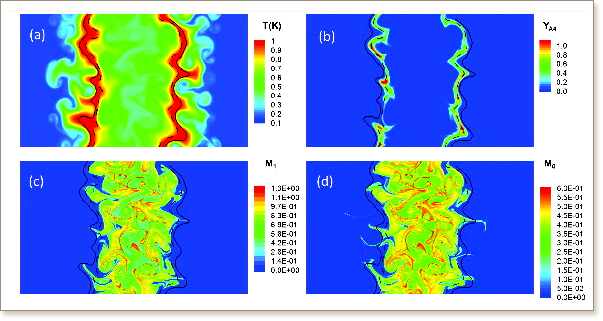

Dynamics of flow–soot interaction in wrinkled non-premixed ethylene–air flames
P. G. Arias, V. R. Lecoustre, S.Roy, Z. Luo, D. C. Haworth, T. Lu, A. Trouvé, H. G. Im
Combustion Theory and Modelling 19 (5), 568-586, (2015)

A two-dimensional simulation of a non-premixed ethylene–air flame was conducted by employing a detailed gas-phase reaction mechanism considering polycyclic aromatic hydrocarbons, an aerosol-dynamics-based soot model using a method of moments with interpolative closure, and a grey gas and soot radiation model using the discrete transfer method. Interaction of the sooting flame with a prescribed decaying random velocity field was investigated, with a primary interest in the effects of velocity fluctuations on the flame structure and the associated soot formation process for a fuel-strip configuration and a composition with mature soot growth. The temporally evolving simulation revealed a multi-layered soot formation process within the flame, at a level of detail not properly described by previous studies based on simplified soot models utilizing acetylene or naphthalene precursors for initial soot inception. The overall effect of the flame topology on the soot formation was found to be consistent with previous experimental studies, while a unique behaviour of localised strong oxidation was also noted. The imposed velocity fluctuations led to an increase of the scalar dissipation rate in the sooting zone, causing a net suppression in the soot production rate. Considering the complex structure of the soot formation layer, the effects of the imposed fluctuations vary depending on the individual soot reactions. For the conditions under study, the soot oxidation reaction was identified as the most sensitive to the fluctuations and was mainly responsible for the local suppression of the net soot production.